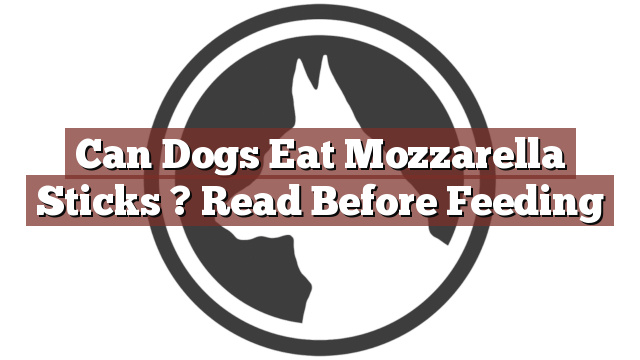Understanding Your Dog’s Dietary Needs
As a responsible pet owner, it is important to understand your dog’s dietary needs. A balanced and nutritious diet is essential for their overall health and well-being. While it is tempting to share our favorite human foods with our furry friends, not all foods are safe for dogs to consume. Certain foods can be toxic to dogs and may lead to serious health issues. It is crucial to educate ourselves about what foods are safe for our canine companions before offering them anything from our plates.
Can Dogs Eat Mozzarella Sticks? Read Before Feeding
Can dogs eat mozzarella sticks? While mozzarella cheese itself is generally safe for dogs to consume in moderation, mozzarella sticks are not recommended for our canine friends. Mozzarella sticks are typically coated in breadcrumbs and fried in oil, making them high in fat and sodium. These fried snacks can be difficult for dogs to digest and may upset their stomachs. Moreover, the excess fat and salt content in mozzarella sticks can lead to weight gain and increase the risk of pancreatitis or other health issues in dogs.
Pros and Cons of Feeding Mozzarella Sticks to Dogs
Before offering mozzarella sticks to your furry friend, it is important to consider the pros and cons. On the positive side, mozzarella cheese itself can be a good source of protein and calcium for dogs. It can be a tasty treat when given in small quantities and can even be used as a reward during training sessions. However, the cons outweigh the pros when it comes to mozzarella sticks. The high fat and sodium content, along with the potential digestive issues and health risks they pose, make mozzarella sticks an unsuitable choice for dog consumption.
Conclusion: Consider Your Dog’s Health Before Sharing Mozzarella Sticks
In conclusion, it is best to avoid feeding mozzarella sticks to your dogs. While mozzarella cheese itself can be given in small quantities as an occasional treat, mozzarella sticks are not a healthy choice for our canine companions. It is crucial to prioritize their health and well-being by providing them with a balanced and proper diet. If you want to reward your dog or share a snack, opt for safer alternatives such as small pieces of plain, unsalted mozzarella cheese. Always consult your veterinarian for specific dietary recommendations for your dog, as individual needs may vary. Remember, a healthy and happy dog is a well-nourished dog.
Thank you for taking the time to read through our exploration of [page_title]. As every dog lover knows, our furry friends have unique dietary needs and responses, often varying from one canine to another. This is why it's paramount to approach any changes in their diet with caution and knowledge.
Before introducing any new treats or making alterations to your dog's diet based on our insights, it's crucial to consult with a veterinarian about [page_title]. Their expertise ensures that the choices you make are well-suited to your particular pet's health and well-being.
Even seemingly harmless foods can sometimes lead to allergic reactions or digestive issues, which is why monitoring your dog after introducing any new food item is essential.
The content provided here on [page_title] is crafted with care, thorough research, and a genuine love for dogs. Nevertheless, it serves as a general guideline and should not be considered a substitute for professional veterinary advice.
Always prioritize the expert insights of your veterinarian, and remember that the health and happiness of your furry companion come first.
May your journey with your pet continue to be filled with joy, love, and safe culinary adventures. Happy reading, and even happier snacking for your canine friend!

